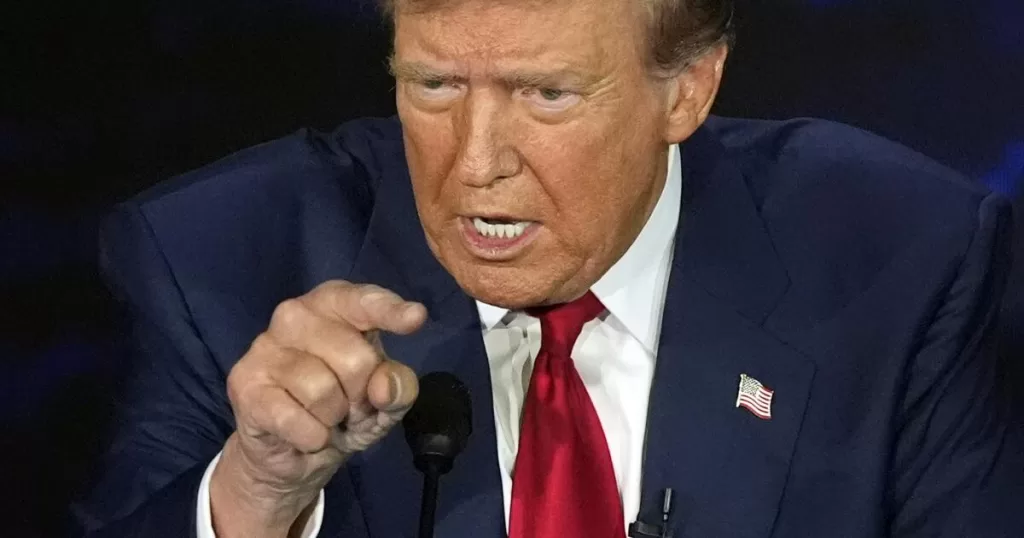Donald Trump said violent crime was exploding across the U.S.
He said Haitian immigrants in Springfield, Ohio, were “eating the dogs. They’re eating the cats.”
He said the Federal Emergency Management Agency diverted disaster relief money to fund benefits for people in the country illegally.
Trump lied incessantly and extravagantly in his bumptious bid for president, after racking up more than 30,500 false or misleading statements during four years in the White House, according to fact-checkers at the Washington Post.
Trump won anyway. Some voters might even have backed him because of his relentless falsehoods.
Which raises several questions.
Is honesty, as in telling the truth, no longer a requirement for seeking and holding public office? Has veracity become one of those quaint relics of a bygone era, like straw boaters and torchlight parades? Should candidates of any and every persuasion feel free to emulate Trump and lie their heads off?
Maybe.
Not necessarily.
First, before we go on, an obligatory nod to the what-about chorus. Yes, politicians of all stripes have been known to lie, fib or shade the truth. It’s been ever thus. But no one in modern memory has done so with the velocity, shamelessness and torrential outpouring of Trump.
Indeed, there may be some hope and comfort in the notion the 45th and soon-to-be 47th president of these United States is sui generis, a one-off, a fabulist political unicorn.
As Kevin Madden, a veteran Republican communications strategist noted, Trump “was a celebrity first and a politician second” after marinating for decades in New York’s saucy tabloid culture, then residing in America’s living rooms as a make-believe boardroom baron in “The Apprentice.”
Simply put, Trump has never been viewed the same way other office seekers are, which is arguably his greatest strength. Even after nearly a decade in which he’s utterly dominated the nation’s political discourse — four of them in its highest elected office — many still don’t see Trump as a politician.
“He’s a unique figure with a unique set of capabilities that defy gravity,” Madden said, and any imitators would find themselves quickly plummeting to earth. “He blocks out the sun against any of his critics. He controls the media cycle with one click on his phone, with one sound bite every single day.”
Does truth even matter?
“Truth always matters,” said Whit Ayres, a Republican pollster and strategist, who said any client thinking otherwise would be shown the door. “That doesn’t mean it always prevails, but it always matters. Reality matters.”
And yet.
An NBC News survey, taken in mid-October, showed Democrat Kamala Harris holding a 10-point lead over Trump on the question of which candidate was viewed as honest and trustworthy. The findings were consistent with other polls conducted throughout the Trump era.
Even so, Trump didn’t just win a second lease on the White House, sweeping all seven of the decisive battleground states. He is on track to narrowly win the popular vote, something he failed to manage in either of his previous two presidential campaigns.
Christine Matthews, a pollster for center-right campaigns and causes, has researched Trump‘s political appeal.
Although certain facts are objectively true — about the crime rate falling, about Haitians not devouring household pets, and so on — Matthews said those truths weren’t necessarily getting through to Trump supporters who took in their information “through highly siloed, very fractured sources. In some cases it’s social media, or memes. It’s YouTube. It’s TikTok. It’s ‘what people are saying.’ ”
And even if they saw Trump’s deceptions for what they were, Matthews said, those inclined to support the GOP nominee — out of concern for inflation, border security or because they didn’t like Harris’ policies or her laugh — found plenty of reasons to excuse his hyperbole and outright lies. Such as: “He exaggerates. He’s a loudmouth. He says things, but he doesn’t really mean them.”
That sound you hear is a thousand fact-checkers, weeping.
Joe Trippi, who has spent decades managing Democratic campaigns from the local to presidential levels, said the party and its candidates can no longer count on conventional media — the three major broadcast networks, CNN, MSNBC, newspapers such as this one — or most social media to counter the lies and distortions billowing from Fox News, Elon Musk’s execrable X or other assertively pro-Trump outlets.
“Journalism and a party that relies on buying ads to combat the lies doesn’t work,” said Trippi, who has started his own social media platform, Sez Us, in hopes of boosting a media ecosystem that elevates civility, credibility and truth-telling.
Jane Kirtley is a professor of media ethics and law at the University of Minnesota, who’s spent years writing about those subjects.
She said the erosion of truth-telling standards and the rise of what Kellyanne Conway, the Trump advisor, famously called “alternative facts” have been a long time coming. “The issue goes back decades in terms of lack of media literacy, lack of critical thinking, platforms that are now viewed by many as news delivery systems when they’re little more than propaganda,” Kirtley said.
Despite the challenges — shrinking audiences, political antagonism, a dire economic landscape — she said independent media must continue “to call out lies and call them lies, if that’s what they are” and, whenever possible, refute them “with concrete evidence.”
But she has no illusions. Kirtley has a relative, she said, who shuts down any familial fact-checking by stating, “ ‘I have other sources of information than you do.’” And that ends the discussion.
“It may be insurmountable, and if that’s true, we may as well give up,” Kirtley said of efforts to fight truth decay and make politicians pay a price for flagrantly lying. “But I’m not quite ready to give up.”
Neither am I.
